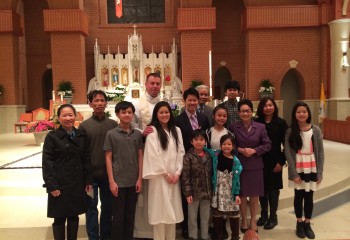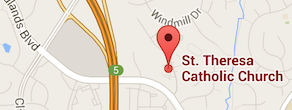OCIA
** This class is full – fill the form below if you’d like to be put on the waiting list **
The Order of Christian initiation (OCIA) prepares you to enter into the Catholic Church by celebrating what are called the sacraments of Christian initiation: Baptism, Confirmation and Holy Eucharist.
If you were already baptized in another Christian tradition, the initiation process prepares you to enter into full communion with the Catholic Church by celebrating the sacraments of Confirmation and the Holy Eucharist.
If you would like to participate in catechetical instruction in preparation for being received into the Catholic Church or if you would like to learn more about the Catholic faith, you are encouraged to contact the Religious Education Office at St. Theresa Catholic Church for more information.
*If you are Catholic and were not married in the Catholic Church, you are encouraged to register for Marriage Convalidation prior to registering for OCIA. Likewise, if you are divorced and remarried, regardless of faith background, you are encouraged to meet with a priest and begin the annulment process prior to registering for OCIA.
Click here to Register for OCIA
OCIA Guidelines: Please read, download, sign and return to priest.
From the Code of Canon Law:
Can. 204 §1. The Christian faithful are those who, inasmuch as they have been incorporated in Christ through baptism, have been constituted as the people of God. For this reason, made sharers in their own way in Christ’s priestly, prophetic, and royal function, they are called to exercise the mission which God has entrusted to the Church to fulfill in the world, in accord with the condition proper to each.
- 2. This Church, constituted and organized in this world as a society, subsists in the Catholic Church governed by the successor of Peter and the bishops in communion with him.
Can. 205 Those baptized are fully in the communion of the Catholic Church on this earth who are joined with Christ in its visible structure by the bonds of the profession of faith, the sacraments, and ecclesiastical governance.
Can. 206 §1. Catechumens, that is, those who ask by explicit choice under the influence of the Holy Spirit to be incorporated into the Church, are joined to it in a special way. By this same desire, just as by the life of faith, hope, and charity which they lead, they are united with the Church which already cherishes them as its own.
- 2. The Church has a special care for catechumens; while it invites them to lead a life of the gospel and introduces them to the celebration of sacred rites, it already grants them various prerogatives which are proper to Christians.
Register for Fall OCIA beginning, Monday, October 27 at 7:00PM:
OCIA 2025-26 Meets at 7:00PM in the Zelie Room on Mondays.
OCIA Fall Schedule 2025-26
Additional Reading
Dei Verbum: “De Divina Revelatione: the Dogmatic Constitution on Divine Revelation of Vatican Council, Promulgated by Pope Paul VI, November 18, 1965.
Lumen Gentium: “Dogmatic constitution on the Church: Lumen Gentium, Solemnly Promulgated by His Holiness, Pope Paul VI, on November 21, 1964.
John, Paul II. On the Family: Apostolic Exhortation, Familiaris Consortio, of His Holiness Pope John Paul II to the Episcopate, to the Clergy and to the Faithful of the Whole Catholic Church Regarding the Role of the Christian Family in the Modern World. Washington, D.C.
Forms Checklists
Complete the OCIA Registration Form, then:
For those seeking Baptism, Eucharist, and Confirmation:
- Selection of Confirmation Saint
- Research the life of a Saint to whom you feel connected
- Submit Saint selection to Fr. John
- Godparent Forms
- Sponsor Form (if your confirmation sponsor differs from your Godparents)
For those seeking Confirmation:
- Baptism Information
- Obtain proof of baptism from church of baptism
- Submit forms to Fr. John
- Selection of Confirmation Saint
- Research the life of a Saint to whom you feel connected
- Submit Saint selection to Fr. John
- Sponsor Form
For those who wish to have their marriage Convalidated:
- Recently issued baptismal certificate for self and spouse (within six months)
- Copy of marriage license
- Completion of Marriage Preparation with a priest to establish freedom to marry
- 4 affidavits (2 for self and 2 for spouse) to establish freedom to marry (obtained at Marriage Preparation)
REQUIREMENTS FOR GODPARENTS
- Two godparents, one male, one female may be used.
- At least one godparent must be a practicing Roman Catholic. The Code of Canon law defines the requirements for Godparents.
- At least 16 years of age
- Must have received the Sacraments of Baptism, Holy Communion, and Confirmation
- If married, must have been married according to the laws and regulations of the Catholic Church. If single, must not be cohabiting with someone without the benefit of Marriage
- Must regularly attend Holy Mass every Sunday and Holy Day of Obligation.
- Must have the Pastor of their parish complete St. Theresa’s Godparent form.
- A second godparent (Christian Witness) may be of another Christian faith (i.e. Baptist, Lutheran, Episcopalian, etc) and must have a letter from the Pastor of their Christian Church. Obviously the Catholic Church does not have competence to issue a letter or verify whether a baptized member of another Christian Faith is suitable to act as Christian Witness. Therefore no such letters will be accepted. (A BAPTISED CATHOLIC WHO LEFT THE CATHOLIC FAITH AND CONVERTED TO ANOTHER FAITH MAY NOT BE A CHRISTIAN WITNESS)

